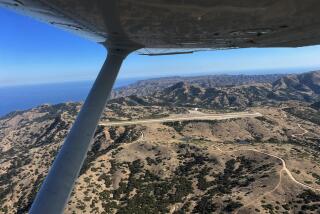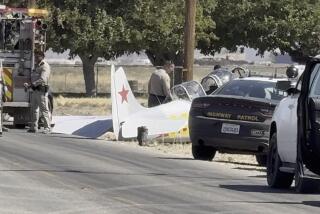Risky near misses between drones and other aircraft surge in California
On Aug. 16, the pilot of an Allegiant Air flight filled with scores of passengers and approaching Los Angeles International Airport spotted a small drone just under the airliner’s wing.
The drone, the pilot reported, “almost hit us.”
He was the fourth pilot approaching LAX to report a dangerous encounter with a small drone in a dozen days.
Pilots across the country are logging a fast-rising number of near misses with drones, 1 of 5 of those risky incidents happening in the skies above California. Those conclusions come from an analysis of federal data released Thursday by Sen. Dianne Feinstein (D-Calif.)
The data shows nearly 200 reports of close encounters involving drones reported in California since April 2014 — the most of any state.
By far the most drone incidents in the state happened above Los Angeles, as planes neared LAX. The Federal Aviation Administration has received 42 reports of drones flying unsafely near the nation’s second-largest airport since April 2014, Feinstein’s analysis found.
A United Airlines pilot reported Aug. 4 that a pizza-sized quadcopter drone passed just under his airliner. Four days later, a WestJet Airlines pilot saw a black robotic copter with red-and-white flashing lights at 1,300 feet. The same day, a pilot flying toward LAX just east of downtown was startled by a drone estimated to be 3 feet long.
But the trouble caused by dangerous drone flights is widespread. The FAA has received reports from 60 cities across the state. Most often the incidents involve smaller drones that have more resemblance to children’s toys than aircraft.
With increasing sales to consumers of small drones equipped with cameras, the number of reported near misses with other aircraft has skyrocketed, raising concerns across the country.
On average, the FAA received 20 such reports each month this spring and summer, Feinstein’s analysis found — up from just one a month in early 2014.
Feinstein said that “reckless consumer drone use” is threatening public safety. She is among a number of politicians who have introduced legislation to limit where and how consumer drones can fly.
Currently, hobbyists flying drones have few federal legal restrictions, although they are warned not to fly within five miles of airports or above 400 feet. Drone operators can be fined if they endanger people or other aircraft, the FAA says.
The agency said Thursday that it was working closely with law enforcement to investigate unauthorized drone operations.
This week, the FAA ordered a Chicago company, SkyPan International, to pay a $1.9-million fine for conducting 65 unauthorized flights in New York City and Chicago. It was the largest penalty ever proposed against a drone operator. SkyPan denies violating FAA regulations.
“Safety is always the FAA’s top priority, and we are concerned about the increasing number of instances where pilots have reported seeing unmanned aircraft flying nearby,” Mike Whitaker, the agency’s deputy administrator, told the House Transportation Committee’s subcommittee on aviation Wednesday.
Some pilots have been forced to take evasive action to avoid the drones.
On July 28, the pilot of a helicopter in Riverside reported having to suddenly change the aircraft’s flight to avoid a white drone with a single wing flying at 1,500 feet.
Three weeks earlier, a plane with a student pilot and instructor flying over Palo Alto was forced to bank right by 35 degrees to avoid a single-rotor drone that appeared to be carrying something, according to the flight trainer’s report. The drone then continued on toward Stanford Stadium, the report said.
Another pilot flying a small twin-engined Cessna on April 22 from Van Nuys to the Bay Area city of Hayward saw a drone pass 3 or 4 feet off his wing. The pilot said the drone was then joined by a second one. The pair of flying robots began following the plane, the pilot told the California Highway Patrol.
Robert Franklin was piloting a six-seater Cessna from Livermore to Chino on April 27 when he heard a loud thump and felt a jolt. When he landed he found two 3-inch-long gouges in the plane’s nose. There was no blood, which would have been expected if a bird hit the plane, indicating that the damage could have been caused by a drone.
Nationwide, the FAA has received nearly 1,000 reports of near misses or other incidents involving drones since April 2014, Feinstein’s analysis found.
But it is not just other aircraft that the drones have threatened. In September, an 11-month-old girl in a stroller suffered a bruise and a cut on her head when a small drone crashed in Pasadena.
The Assn. for Unmanned Vehicle Systems International, the drone industry’s largest trade group, joined with the FAA and other organizations late last year in an effort to teach consumers how to operate drones safely in a campaign called “Know Before You Fly.”
In August, the trade group said it supported tougher action against “careless and reckless operators and those who violate restricted airspace.”
“Stricter enforcement will not only punish irresponsible operators,” said Brian Wynne, the trade group’s president, “but it will also serve as a deterrent to others who may misuse the technology.”
Twitter: @melodypetersen
More to Read
Inside the business of entertainment
The Wide Shot brings you news, analysis and insights on everything from streaming wars to production — and what it all means for the future.
You may occasionally receive promotional content from the Los Angeles Times.











